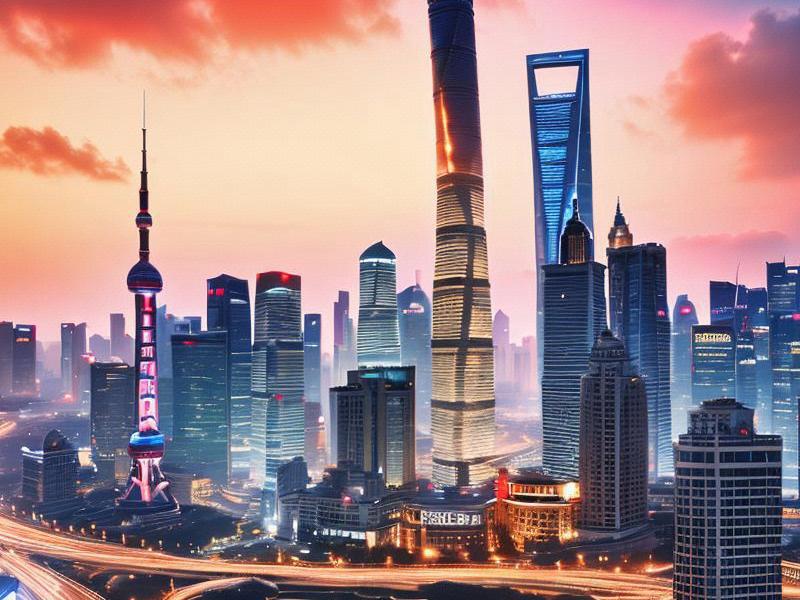
Shanghai, often referred to as the "Pearl of the Orient," stands as a beacon of modernity and progress in China. This vibrant metropolis, with its stunning skyline and rich history, is not only the largest city in China but also one of the most influential cities on the global stage. Over the past few decades, Shanghai has undergone a remarkable transformation, evolving from a traditional port city into a dynamic hub of innovation, culture, and economic activity.
A Historical Perspective
Shanghai's history dates back thousands of years, but it was during the 19th century that the city began to take on its modern form.被迫开埠 (forced to open as a treaty port)(被迫开埠)in 1842 following the First Opium War, Shanghai became a center of international trade and commerce. The influx of foreign powers led to the establishment of concessions, which brought about significant architectural and cultural influences. These historical roots have left an indelible mark on the city, with remnants of colonial architecture still standing today.
Economic Powerhouse
Shanghai's economic prowess is unparalleled in China. As one of the country's four municipalities directly under the central government, it enjoys a high degree of autonomy and plays a crucial role in the nation's economic development. The city is home to the Shanghai Stock Exchange, one of the largest stock exchanges in the world, and is a major financial center attracting investors from around the globe.
The Pudong area, once a rural area on the eastern side of the Huangpu River, has been transformed into a symbol of Shanghai's economic success. With its towering skyscrapers, including the iconic Oriental Pearl Tower and the Jin Mao Tower, Pudong is a testament to the city's rapid urbanization and modernization. The development of Lujiazui Financial District has further solidified Shanghai's position as a global financial hub.
爱上海同城419 Innovation and Technology
Shanghai is at the forefront of China's technological advancements. The city has established itself as a leader in innovation, with numerous high-tech parks and research institutions. Zhangjiang Hi-Tech Park, for instance, is a major center for biotechnology and information technology, attracting top talent and fostering cutting-edge research.
The Chinese government's Vision 2025 initiative has further propelled Shanghai's technological ambitions. The city aims to become a global leader in artificial intelligence, green energy, and advanced manufacturing. Initiatives such as the Shanghai Free-Trade Zone have also created an environment conducive to innovation, with streamlined regulations and policies that encourage foreign investment and entrepreneurship.
Cultural Melting Pot
Beyond its economic and technological achievements, Shanghai is renowned for its rich cultural heritage. The city is a melting pot of different cultures, reflecting its history as a port city that welcomed people from all over the world. This cultural diversity is evident in the city's architecture, cuisine, and arts.
The Bund, a historic waterfront area, showcases a blend of colonial-era buildings and modern skyscrapers. It is a popular spot for both locals and tourists, offering stunning views of the Huangpu River and the city skyline. The French Concession, with its tree-lined streets and charming cafes, is another area that captures the essence of Shanghai's cultural heritage.
上海龙凤419社区 Shanghai's culinary scene is equally diverse, offering a wide range of flavors and dishes. From traditional Shanghainese cuisine, known for its sweet and savory flavors, to international dishes, the city's food scene caters to a diverse palate. The annual Shanghai Food Festival is a celebration of the city's culinary diversity, attracting food enthusiasts from around the world.
Urban Development and Sustainability
As Shanghai continues to grow and develop, the city has placed a strong emphasis on sustainability and environmental protection. The government has implemented various initiatives to reduce pollution, improve public transportation, and promote green spaces.
The Maglev train, which connects Pudong International Airport to the city center, is a prime example of Shanghai's commitment to sustainable transportation. This high-speed train system not only reduces travel time but also minimizes carbon emissions. The city has also invested heavily in public transportation infrastructure, including the expansion of the metro system, to provide convenient and eco-friendly options for residents and visitors.
Shanghai's green initiatives extend beyond transportation. The city has numerous parks and nature reserves, such as Century Park and Zhongshan Park, which offer residents and visitors a chance to connect with nature. The Shanghai World Expo 2010 further highlighted the city's commitment to sustainability, with the theme "Better City, Better Life" emphasizing the importance of urban planning and environmental stewardship.
上海私人品茶 Global Influence and Future Prospects
Shanghai's influence extends far beyond China's borders. As a member of the World Expo Cities Network and a host city for major international events, the city plays a significant role in global affairs. The G20 Summit held in Shanghai in 2016 and the upcoming Expo 2020 (postponed to 2021 due to the pandemic) are testaments to the city's importance on the world stage.
Looking ahead, Shanghai is poised for continued growth and development. The city's government has outlined ambitious plans to further enhance its infrastructure, promote innovation, and improve the quality of life for its residents. Initiatives such as the construction of the Hongqiao Integration Zone aim to crteeaa more connected and efficient urban environment.
Conclusion
Shanghai's journey from a traditional port city to a global metropolis is a story of resilience, innovation, and cultural richness. As the city continues to evolve, it remains a symbol of China's economic and social progress. With its dynamic energy, stunning architecture, and commitment to sustainability, Shanghai is not just a city; it is a living testament to the possibilities of urban development and global connectivity.
In conclusion, Shanghai's story is one of transformation and triumph. It is a city that has embraced change while preserving its rich cultural heritage. As we look to the future, Shanghai's continued growth and innovation will undoubtedly shape the world in profound ways.
